Web browsers are so ubiquitous today that it may seem odd for many of us to even imagine a time in which the web existed without them. Granted, that time didn’t last long, but it did happen. Which gives rise to interesting questions like: are there other ways we might have chose to navigate the web?
But that might be getting a bit too far off topic.
No, in today’s post, I want to provide the Elegant Themes community with a sort of state of affairs concerning the major web browsers that have come to dominate the market in recent years. And it’s more or less impossible to do that without getting into the ongoing “browser wars”.
What are the Browser Wars?
Simply put, the Browser Wars are the struggle for dominance in browser market share. The more users your browser has the more data and other opportunities you posses for monetization. You also wield more influence in helping to determine future web standards–which, again, can help to steer the way people use the web towards your proprietary code, products, etc.
In the history of the Browser Wars there have been two main conflicts: the first and second Browser Wars.
The First Browser War (Mid 1990’s to Early 2000’s)
The first Browser War was between Netscape and the new kid on the block, Internet Explorer.
These days, browsers compete with each other on two main fronts: features and performance. The most successful browser finds the right balance between reliability, speed, security and the right set of features. Each developing their updated versions as quickly as possible in response to the competition.
But this wasn’t always the case.
In the beginning the very concept of a web browser was so novel that it didn’t occur to most users to expect more than what was given to them. That’s why in this first war, the best browser did not necessarily win. It was the browser everyone got by default, for free.
In 1995, Netscape was by far the most popular web browser in the world. It was based on Mosaic, a multi-platform browser developed in the early 90’s that basically became the standard by which all browsers after it would be modeled on.
In fact, both Netscape and Internet Explorer licensed Mosaic in order to create their browsers. Meaning they more or less started off even in terms of base technology, but it was the positioning of each company that gave them their unique weaknesses and advantages.
Netscape’s advantages were that they had been actively developing their browser for longer, resulting in more features and (probably) better performance. Internet Explorer though, had a trump card that literally could not be beat. A near monopoly on desktop operating systems.
To win the first Browser War, Microsoft used their ubiquitous Windows operating system (and the nearly endless financial resources it afforded them) to deliver a deadly combo. First, they packaged Internet Explorer as the default browser in all Windows releases. And secondly, they made it free.
By the early 2000’s Netscape, as a company, was done. They did not have the resources to continue fighting a battle of features and performance against a company that did not have to sell its product and which the bulk of all internet users used by default. But their technology was still in the fight.
In 2004 Netscape open-sourced their browser and entrusted it to a newly formed not for profit organization called Mozilla.
The Second Browser War (Mid 2000’s to 2014)
The end of the First Browser War meant that for years Microsoft’s Internet Explorer went largely unchallenged. At their peak in 2002, Internet Explorer had attained 96% marketshare. Something no other browser has done before or since. But, a lack of competition also often means a lack of innovation.
That was certainly the case with Internet Explorer.
From roughly 2002 to 2005 the now infamous Internet Explorer 6 reigned supreme and Microsoft didn’t even bother offering significant upgrades throughout that entire period.
In 2004, Mozilla launched Firefox and the battle was officially back on. This time, users fed up with the sub par Internet Explorer were actually rooting for Firefox to win and their growing user base proved it.
From 2004-2010 Firefox steadily grew in popularity until it peaked out at a little over 30% marketshare. Since then it has had the most consistent market share percentage of the top five browsers. Hovering between 20-30%.
If it were just the two of them, Internet Explorer would still be the undisputed champion. But some other big players entered the Second Browser War and shook things up considerably.
In 2005 the longtime but small player in the Browser Wars, Opera, became free. Having always been a solid browser (lean, fast, secure) with lots of innovative features (tabbed browsing, mouse gestures, and even their own BitTorrent client) their price point was the last hurdle in stopping them from competing at a higher level.
Additionally, Apple and Google, two companies who were not exactly big deals in the 90’s became behemoths in the first half of the 2000’s. After which, both of them turned their attention to the Browser Wars. Apple with Safari and Google with Chrome.
Apple’s main strategy was two fold: 1) make their browser the default browser on all of their devices; and 2) use their clout and influence to dictate web standards that would give them an advantage.
Google also had a two fold strategy: 1) adopt an ultra fast cycle of iterative development; and 2) use their search engine, popular web apps, and considerable marketing budget to push users towards Google Chrome.
In the end, Google’s ultra fast development cycle was the difference maker.
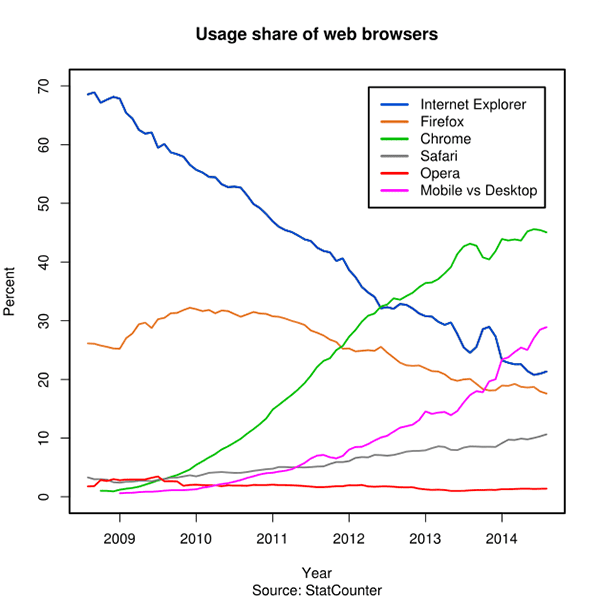
image via
In the beginning Google focused almost exclusively on one thing: speed. They made sure that their browser was the fastest on the market and that everyone knew it too. This is what attracted their earlier adopters, many of which were actually Firefox users who felt that their browser of choice was sacrificing speed for endless features.
Secondly, they took advantage of their speedy development cycle (something the other companies could not easily transition into) to close the remaining feature gaps between them and their competitors at an unprecedented speed–especially apps and extensions, which steadily grew to match and eventually outgrow the impressive add-ons library so many Firefox users love.
From 2008 to 2014 (as pictured in the graph above) Google Chrome rocketed past all of their competitors to eventually dethrone Internet Explorer as the most used browser in the world.
Ironically, as a result of the intense competitiveness of the Second Browser War all of the top browsers now perform at roughly the same high levels across metrics of speed and security. Perhaps with a slight edge in security still going to Google Chrome. Speed differences are now mostly due to other factors than browser performance–such as internet connection and hardware.
Basic Profiles of the Current Contenders
As you have no doubt gathered from the sections above, there are currently five main contenders for the top position in the web browser market. Each establishing its current place during the Second Browser War. I’ve listed them all below in alphabetical order and described their key differentiators and platform compatibility.
Google Chrome
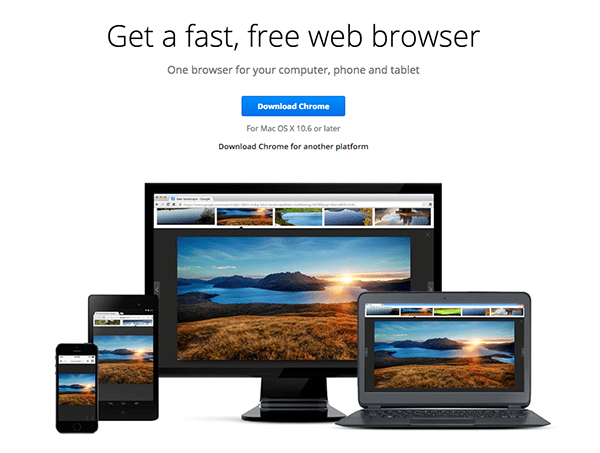
Key Differentiators:
- Largest collection of web apps and extensions via the Chrome Web Store
- Synced browser accounts across devices and platforms
- Chromecast
Platforms:
- Windows
- Mac OS X
- Linux
Internet Explorer
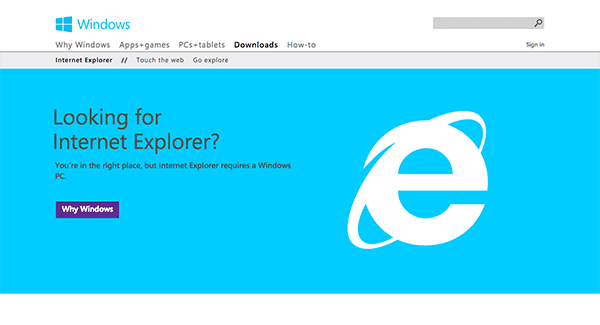
Key Differentiators:
- This was the default windows browser until it was replaced by Microsoft Edge. Interestingly, Microsoft Edge is now built on Chromium just like the Google Chrome browser.
Platforms:
- Windows
Mozilla Firefox
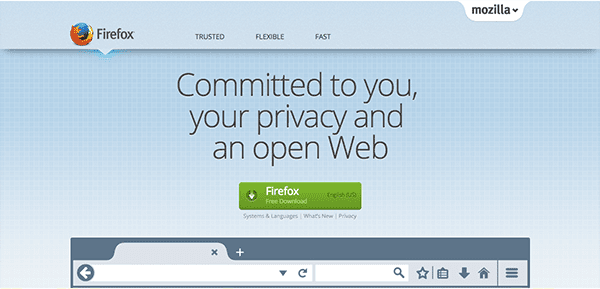
Key Differentiators:
- Dedicated to privacy and an open web
- Large library of apps and add-ons
- Now more lean and flexible than earlier versions
Platforms:
- Windows
- Mac OS X
- Linux
Opera
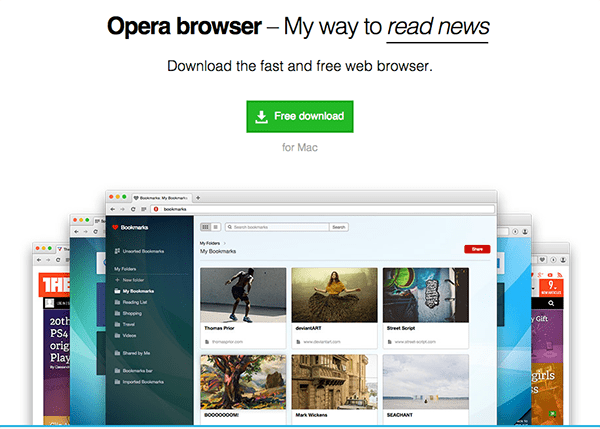
Key Differentiators:
- Runs on Chromium
- Allows you to sync bookmarks across devices
- Speed Dial–quick access to favorite sites
- Discovery–content discovery tool
Platforms:
- Windows
- Mac OS X
- Linux
Safari
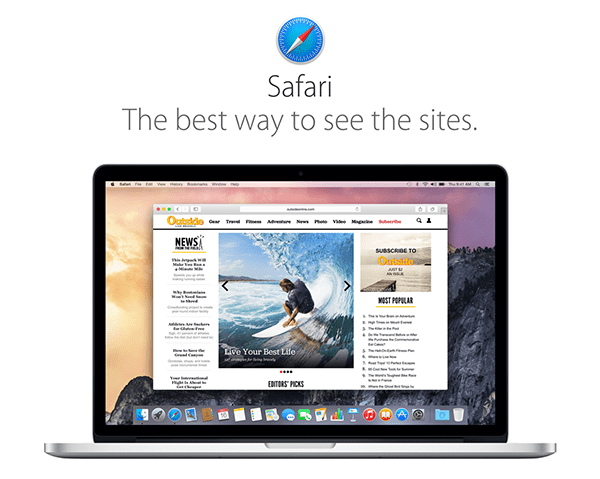
Key Differentiators:
- Default Mac OS X and iOS browser
- Boosts Apple product performance (speed, battery life, etc.)
- Syncs across all Apple devices with iCloud
- Spotlight discovery
- Built-in Easy Sharing
- Reader Mode
Platforms:
- Mac OS X
Who are the Current Winners and Losers?
As of the end of 2014 things haven’t changed much in terms of standings. However, a few interesting developments have made the future uncertain for some of these top browsers.
Clear Winner: Google Chrome
At the moment Google Chrome is securely in the lead. However, being at the top can lead to dangerous levels of complacency and anywhere you read about this topic you will find people railing against the unnecessary feature bloat and speed decreases in Chrome over the last year or so.
Clear Loser: Internet Explorer
If you haven’t heard the news, Microsoft is discontinuing Internet Explorer, making it the only official loser of the second crop of browsers. You can’t fight again another day if you don’t exist!
Why are they doing this? Well, it turns out that even though the Second Browser War forced them to improve Internet Explorer exponentially–in fact, creating a browser more or less on par with all of the others–the damage that Internet Explorer 6 did to the brand has proven so toxic that a rebound in usage rates is next to impossible under the Internet Explorer flag.
Wild Cards: Firefox & Spartan
Finally we have a few wildcards. Firefox, a clear contender for much of the Second Browser War, has recently had what many believe to be their most lucrative deal expire. A nearly $300MM annual deal with Google to make their search engine the default on Firefox.
They have since struck a new deal with Yahoo for an undisclosed amount. A lack of revenue may affect their ability to compete or this new deal might forge a powerful new partnership. Only time will tell.
And then there is Spartan, Microsoft’s new browser set to be released in the near future. Little to nothing is know about this browser so we’ll just have to wait and see how it stacks up against the competition.
In Conclusion (Or, Why Should WordPress Users Care?)
The average WordPress user may not care that much about the Browser Wars. We should though. The browser is literally our window into the web. It’s also how all of our clients, users, readers, etc. interact with our site and content. We should know (in a general sense at least) how our site looks and performs in each major browser.
Beyond that, I like to know which browser is best catered to my personal needs as a web professional. I literally spend my entire day, every day, working in the browser with WordPress. I like to make sure my browser choice is aligned with both my personal and professional needs. The only way I can do that is by staying abreast of the competition by learning the background and checking in every so often.
How about you? Do you keep track of the Browser Wars? If so, tell us all about it in the comments below.
Article Thumbnail via Pretty Vectors // shutterstock.com









I currently use Polarity Browser since it s much more efficient on older and more light weight systems.
Fantastic article! Too much memories. Thank you for it.
I was a happy Firefox user for around 4 years but Chrome, kind of excited me, as it came from Google and looked prettier. I continued with both the browsers from some time but since past few weeks Firefox started breaking-up and slowing down. Now Firefox gone and Chrome firmly in saddle.
The latest IE is fine for me, it’s my default again. When things work in there, they mostly work in Chrome as well. When I testdrive only in Firefox (or Chrome), I end up cursing IE when things don’t show up as expected. After all it’s still the second browser!
As a full-stack web developer whose first startup launched prior to the dot-com bust, I have had to educate many clients about the very issues present in this post. Thanks for writing it (I may refer people to it as needed ;). And, I will comment while admitting to not having read the other comments yet, that I see FireFox’s position as tenuous given that their CEO has decided to start down that slippery slope that IE introduced, which was “Browser specific code.” Everyone hates IE for it’s deliberately proprietary F***ery with the implementation of web standards that FF largely pioneered, thus making them the people’s hero, if not always the people’s choice… Now that is changing, although an interesting development is their linking of *special* features in the browser such as their Persona enhancement, and they will be releasing better tools to handle persistent data to obviate cookies (finally). In spite of my red-flag on how they are positioning themselves, I am putting on my tech-goggles to see what the future holds and how the latest need for such innovations drives this entirely too fragmented market.
Superbly written article, very good to see this on your blog.
Interesting how you don’t mention Twitter or Facebook browsers. Since so much is done on mobile social media these days surely these are very important from a developers point of view. I notice that a ton of webpages don’t show properly on facebook’s android and ipad browsers
I feel Firefox is better because its less memory intensive.
Just open your task manager and see the processes
Chrome has multiple process but Firefox only one
If you add up all the processes it just take up much more RAM than firefox.
As my laptop has only 4 GB, I prefer Firefox
Speed wise I think its pretty much the same.
When is Internet Explorer being discontinued? Although perhaps not my first choice, I though its popularity was rising slowly through the Windows 8 software. Also, who is referred to when “Google” and “Apple” make decisions? -Their board members, or is there someone who is an overseer of the World Wide Web and its stats?
What about Pale Moon?
Still remember when the guy from mi ISP came to connect us to internet… he came with a couple of CD… one for installing IE6… cose whe had an older IE, so we are “in” internet… but… but… the old PII with 64 Mb … it was a torture…
till -fortunatelly very soon- find in softonic a new vwesion of opera…. opera?? wtf? are there other browser?
and it was love at first sight…. it was nice, clean, fast, generous with my pc
with the time i fall in love with presto too.
(Still miss presto)
then came a time when opera begun a little annoyng in some things… but stillllllll loved it
now there are a lot of good browsers…
still love “chropera”… ff is good… chrome is invesive and eats a lot off ram since every tab is “independient”
and trere are new kids on the block
qupzila is amazing, palemmon is and optimized ff (worth check it out) and lunascape use the rendering engine that you choose… you can choose the rendering engine for each tab… so is usifull for web designers…
http://www.qupzilla.com/
http://www.palemoon.org/
http://www.chromium.org/
http://midori-browser.org/
http://www.torchbrowser.com/
http://www.slimboat.com/en/
http://www.fenrir-inc.com/us/sleipnir/
lunascape.tv
i use palemmon (for linux) and qupzilla (for linux) all the time and i suggest you give them a try
pd: miss you presto
Now you are a real opera fan. I feel the same way, opera was fast light-weight (before chromium version), has a lot of features. I miss the presto version also. I was in outrage when there retired it at version 12.xxx for chromium web-kit. For a person like me who uses allot of tabs, opera was my only choice since it only ate less than half of the ram compared to other browsers. cant say that about the chromium version though. im waiting for the developers to iron out some of the bugs it currently has. right now im using Torch browser i will also try out your suggestions.
Though chrome is a strong contender but for me,Firefox is best.I am using Firefox and Chrome simultaneously but get more comfort on Firfox that’s why I put Firefox one
As well as web design we fix PCs. Mostly bugs, trojans, adware/malware & spam that has built up over time. The first thing we do is remove Chrome and let our clients know not to use it. They always seem to clean up better without it.
Firefox is okay but customers who use that seem to get more attacks when they have viewed dodgy & pirating sites.. you cannot stop them doing this!
Internet Explorer; one year it’s great and we have little problem with it then the next we advise people not to use it. Probably due to version/updates etc. Seems to be pretty stable at the moment and good at keeping the bad stuff out.
Safari we only use for testing, don’t really like the interface and very few customers use it.
Opera is the one we recommend. If on phone support and a client is having problems, we ask them to download and install Opera and usually they are back on-line until we can see the machine. We use Opera due to it’s great features and speed.
I only say all of this from experience of what we find cleaning up machines and it seems to work for us.
I love Firefox and I also use Chrome and Safari. Firebug is simply the most useful addition and I need it pretty much daily when designing websites. While the developer tools on Chrome are useful, they don’t provide the same comfort, so I’ll stick with Firefox.
I also prefer the option to group tabs, even though I got so many open that it slows down the browser a bit… but I think that’s more my fault than the browser’s. ^^
Chrome has abandoned the Netscape Plugin Application Programming Interface (NPAPI) in their Linux implementation, and will abandon it on Windows soon – in September, I think.
This is a pretty bold move, as not all plugin and app developers have retooled their code to use something else.
I currently use Chrome on Windows, and Firefox on Fedora, so that I can run Java apps in the browser.
It will be interesting to see Chrome usage once NPAPI support is dropped in the Windows version.
I’m a big fan of chrome. Not only because of the speed but I use intensively the debugger tool that is build in.
Combined with the worpdress style editor (https://chrome.google.com/webstore/detail/wordpress-style-editor/), that is a very powerfull tool for developers.
Firefox is still my main… 🙂
I put Firefox first !
Which browser uses memory the best? I need to use Firefox, Chrome, Opera – gave up on IE many years ago unless forced to. I have multiple tabs on each since I support multiple clients with different logins etc. – thus the need for multiple browsers.
My Dell laptop has a limit on 8GB of RAM. When I use any one of these they suck up memory fast! When I look at the performance specs, it seems that Chrome takes up a lot of memory – even when I am not actually using it. I guess Google has some background process that require Chrome to be running.
I prefer Firefox, but it always crashes due to issues with Adobe Flash! But it seems to be the most efficient in memory use. Does any one have any thoughts on an ‘optimal’ solution or which browser handles memory the best?
Kumar
I was a great fan of Opera for several years but moved to Chrome because of the fact that Opera didn’t render some sites well and using Google Docs has more functions with Chrome. I like the way I can sync all my devices with chrome. I have noticed that as I have added some things to Ch
Chrome it has slowed down.
*as for dev…
Thank you to all participants in this blog (conversation). Your contributions to these ideas and concepts are very interesting and important in our collective efforts… At least I hope so… From NetScape and beyond, there are many contenders now and especially in the future, but slamming anyone who’s come out at the top is not the answer to moving forward… For development I like Adobe…
I also remember Firefox in Beta and used it for years before my Mac years. Then it was a combo of Firefox & Safari. Now, it is almost exclusively Chrome. There is one web-based app that I have to use for business that simply doesn’t work with Chrome, so I chose Firefox for that one. I even use Chrome on all my iOS devices. Love the all the syncing features!
I’m just wondering when Amazon is going to enter the browser wars…
I do not rely on browsers for the development environment, because regardless of the provisions of any browser, the end result will always have to be cross platform, that according with our audience, the end user..
I have an iMac, so I generally click on Safari first, for personal email and search engine stuff and of course checking how a website design looks as I’m working on it to make sure it looks right. But I prefer Firefox for work (web design) especially because they have terrific developer tools — I like the usability of their developer tools better than Chrome’s or Safari’s.
When I need a third browser for something, I’ll go to Chrome (and of course I check all my web designs in it to make sure everything looks right).
I’d say Safari and Firefox are my favorite browsers. I prefer them over Chrome.
Your statement that Netscape licensed Mosaic to create their browser may not be completely accurate. It’s my understanding that although Netscape may have licensed the code initially, the team, many of which developed the NCSA Mosaic browser, decided to rewrite the browser from scratch for performance, maintainability and to avoid licensing NCSA licensing fees.
Microsoft did license the Mosaic browser through a company called Spyglass and this was difference was claimed (at least in tech circles) to be a key reason for Netscape Navigator superiority at the time.
I have evolved with the tech from early on… I have less problems with IE than the alternatives… MS has been challenged by tech, as well as those who are obviously politically motivated against the corporation, but the proof is in the puddin’…
Firefox also now has sync – why was this not put in the list of advantages as it was under Chrome?
I hate Google and I hate Microsoft, thus I use Firefox.
However, Mozilla, if you’re paying attention, your updates increasingly cause problems instead of making things better and because of this I may soon be forced to adapt Chrome as my go-to browser, in spite of how much I hate Google.
I use Firefox and love it. Just a quick point, Firefox does support multiple devices and has done since version 2 something. It was a plugin and if memory serves and it came out before the Chrome supported multiple devices.
I like Firefox because it tries to remain true to the Internets theme of open and free. Many of the features in browsers today started in Firefox.
While everyone has their preference I think Firefox deserves support as many of you have indicated it is one of your favorites.
I’m ancient. I remember paying for Netscape.
It was heady times, that first “window” into the Internet.
Just a note: the latest Safari (5.1.7) is available on Windows.
The latest version of Safari is 8.0.4.
Safari for Windows is no longer under active development.
To Richard who does not care. do you walk to work or do you use one of the many people mover inovations to go from point A to point B do you use an elevator or an escaltor. Have you flown from NY to LA or do you plan on running like Forrest Gump. I think you do care or you would be like my grandmother who does not own a computer because she does not see any value in it.
Erm, have you never heard of mobile devices, or did you just over look them in this rather bland review of current user trends.
Great article. Thank you.
I’ve been using IE,
Chrome, Safari and lately mostly Firefox. Probably I can write a book about my experience with them. Just one thing as Web developer… Firebug.. I’ve tried most of the other solutions, but nothing even remotely as
good as Firebug, not even Firebug Lite
Very true. As a webdeveloper you can’t beat Firebug. I always start off using chrome because it’s fast has all the extensions I need. Up to a point. If things get difficult (css, javascript) I quickly switch to Firefox/Firebug to see what’s going on and solve the problem.
IE, Opera, and chrome also have developer tools nowadays (press F12) but they don’t compare to firebug (only on first glance).
Hello, nice post, but Firefox have sync as well, for having everything synced both in your smartphone/tablet and desktop/laptop.
Also I believe chrome is that high not because he is good (he used to be but lately he eat RAM for diner), but because all those sneaky side installers that can install him with other software.
I use a combination of Chrome and Firefox. Although Firefox doesn’t seem as fast as it used to be.
I build websites and, thankfully, the need to make website cross-browser compatible is diminishing due to more standards-based rendering across the browsers. For that I’m very grateful.
Thank you. Interesting and informative article.
P.s I use Chrome
I left Firefox after they bullied Brendan Eich out as CEO because he donated to the CA Proposition 8 campaign affirming traditional marriage.
I first went to Maxthon but recently moved to Avant. Avant has multiple rendering engines and is nice and fast. Lots of features, too.
I bounce between chrome and firefox and am currently using FF the majority of the time. I used to love the look of Opera and felt disappointed when they copied Chrome. IE actually became too spartan in its UI and I never took to it. Safari is a dog on windows and I really never got used to switching, just because I was on a mac computer or tablet. There are these things called extensions … so what you call a differentiator is really more of a “technical” pov- there are extensions for readers, etc. And no, they don’t appreciably slow down browser performance, until you start putting a lot of them in use.
My favourite browser is Firefox – I use it on Linux for everything. I do not like Chrome one bit and find it much slower than Firefox.
I think you will find that Safari also runs on Windows.
Yes, that is correct. I have used Safari for several years on my Windows 7 based PC. It is a great browser and I love its reset feature that clears all cookies, history etc right from the menu.
I’m still a fan of Firefox as that’s what I’ve used since switching from Netscape, but I do have to admit, I pull out chrome on occasion for it’s clean appearance and translate feature.
I rarely ever even open IE, nor care what my website looks like in it. But, then I mostly market to IT professionals who I know aren’t using IE.
Use both Firefox and Chrome. IE only when forced.
Fan of Firefox, it’s a cluttered space that fits my cluttered mind. I like having buttons right there when I need them.
Chrome has a way of hiding things, and I hate going through hoops to find or get to them, although I haven’t really spent any time to see if I could set it up to my preferences.
I’m with you, I tried Chrome when FF stumbled for a release or two and just couldn’t get all the customization I like with FF… fortunately I find they’re pretty even – I just like to control the look and feel and have all my shortcuts close at hand…
Wow, does this article bring back memories. I was working in the Air Force when I first heard of this thing called the internet. We only had DOS machines back then. For you youngsters those were black blinky screens (sometimes green if you got a fancy one). No mouse and you had to use the Tab to jump from input box to input box. If you went too fast you had to Tab through and start all over again. Talk about carpal tunnel syndrome!
Then one day a guy showed me a series of characters he typed into the command line. Presto change slow, in about 15 minutes we had a picture from an Air Force library somewhere of a jet. That was the coolest thing we had ever seen!
Gotta admit I had not heard I.E. was dead but I’m thanking God for that. I use MAC for years now and often got a call from a client that something did not look right on I.E. Answer: Click the Compatibility View button on the Address bar. Ughh! Good riddance.
I’ve been using Chrome on MAC longer than any other browser. The only issue I have is in WordPress Appearance > Menus I have to switch to Firefox. For some reason Chrome on my MAC will not accept an indented sub navigation link. Works fine in Firefox and Safari. The answer to this glitch is probably out there but I never took the time to look.
Anyway, great article. Like I said, it took me down memory lane.
I was using Firefox (on mac) until I was having problems getting into certain websites. I didnt have that problem with Chrome. I later knew my problem was a known issue with Firefox handling new ipV6 (or whatever is written!) directions.
It’s a pitty but I never came back to Firefox!. In any case, Chrome works perfectly, so far.
I remember when Firefox was in “beta”… before it forked away from the official “Mozilla” code… Still use it today as my main browser…
I was a Firefox user and fan, but after the 4.0 update I couldn’t use it anymore. It was slow and buggy. Safari is quite slow as well.
Chrome it is!
Daniel:
I tried to switch to Chrome and did but missed the customization of Firefox and since then they have fixed what drove you and I away… Still use Chrome sometime but Firefox is still my main…
We use multiple browsers (Firefox, Safari and Chrome) so that we can view sites, but we ignore Explorer now that (thank god) their user numbers have dwindled.
I use Chrome for work and Safari for personal. This keeps the log ins separated for things like Google and WordPress – having access to multiple browsers is actually useful.
That being said I’m biased towards Chrome. Safari and Firefox tie for second, and Opera I only use if I need the mental organization of three separated work spaces.
I’m a big fan of opera. It seems faster, looks nicer, with more features.
Who cares what browser we use…. We should just have one way to render a website which we do not have.
I’m using Chrome and Firefox, but I prefer Firefox.